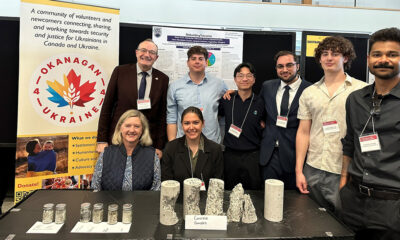Science
UBC Study Conclusively Debunks Computer Simulation Theory

A recent study from the University of British Columbia Okanagan (UBCO) has made a bold claim: the concept of living in a computer simulation, popularized by films like *The Matrix*, is not just unlikely but impossible. This groundbreaking research, led by Dr. Mir Faizal and his colleagues, employs mathematical principles to challenge the very foundation of the simulation theory.
The findings, published in the *Journal of Holography Applications in Physics*, argue that reality operates in ways that a computer cannot replicate. UBCO asserts that the research reveals a more profound truth: the universe is constructed on a framework that exists outside the limits of any computational algorithm.
Dr. Faizal, an adjunct professor at UBCO’s Irving K. Barber Faculty of Science, explained, “It has been suggested that the universe could be simulated. If such a simulation were possible, it could give rise to life that might create its own simulation.” He noted that this recursive idea initially seemed beyond scientific inquiry, yet the team’s research demonstrates that it can be addressed scientifically.
In the realm of modern physics, quantum mechanics has reshaped our understanding of reality. UBCO highlights that the cutting-edge theory of quantum gravity suggests that even space and time are not fundamental; instead, they emerge from a deeper layer of pure information.
The research team illustrated that an information-based foundation cannot fully describe reality through computation alone. They likened a computer’s function to following a recipe, where each step is predetermined and logical. UBCO clarifies, “Some truths can only be grasped through non-algorithmic understanding—understanding that doesn’t follow from any sequence of logical steps.”
Dr. Faizal elaborated that their research indicates it is impossible to encapsulate all aspects of physical reality using a computational theory of quantum gravity. “Therefore, no physically complete and consistent theory of everything can be derived from computation alone,” he stated. This understanding is deemed more fundamental than the computational laws of quantum gravity and spacetime itself.
Dr. Lawrence M. Krauss, a co-author of the study, emphasized the significant implications of their findings. “The fundamental laws of physics cannot be contained within space and time because they generate them,” he said. Historically, there has been hope that a universal theory could eventually explain all physical phenomena through computations. However, this research indicates that such a comprehensive description of reality necessitates a deeper understanding known as non-algorithmic understanding.
“Any simulation is inherently algorithmic—it must follow programmed rules,” Dr. Faizal concluded. “Since the fundamental level of reality is based on non-algorithmic understanding, the universe cannot be, and could never be, a simulation.”
This study marks a significant scientific achievement, challenging long-held beliefs about the nature of our universe and its relationship to computational theory. For more details, the full release about the study is available on the UBCO website.
-

 World4 months ago
World4 months agoScientists Unearth Ancient Antarctic Ice to Unlock Climate Secrets
-

 Entertainment4 months ago
Entertainment4 months agoTrump and McCormick to Announce $70 Billion Energy Investments
-

 Lifestyle4 months ago
Lifestyle4 months agoTransLink Launches Food Truck Program to Boost Revenue in Vancouver
-

 Science4 months ago
Science4 months agoFour Astronauts Return to Earth After International Space Station Mission
-

 Technology2 months ago
Technology2 months agoApple Notes Enhances Functionality with Markdown Support in macOS 26
-

 Top Stories3 weeks ago
Top Stories3 weeks agoUrgent Update: Fatal Crash on Highway 99 Claims Life of Pitt Meadows Man
-

 Sports4 months ago
Sports4 months agoSearch Underway for Missing Hunter Amid Hokkaido Bear Emergency
-

 Politics3 months ago
Politics3 months agoUkrainian Tennis Star Elina Svitolina Faces Death Threats Online
-

 Technology4 months ago
Technology4 months agoFrosthaven Launches Early Access on July 31, 2025
-

 Politics4 months ago
Politics4 months agoCarney Engages First Nations Leaders at Development Law Summit
-

 Entertainment4 months ago
Entertainment4 months agoCalgary Theatre Troupe Revives Magic at Winnipeg Fringe Festival
-

 Top Stories1 week ago
Top Stories1 week agoFamily Remembers Beverley Rowbotham 25 Years After Murder



















